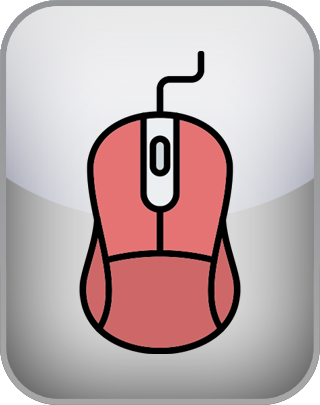Mouse Clicker Test: CPS (Clicks Per Second)
The Mouse Clicker Test is an exciting way to challenge your speed and reflexes with a simple yet engaging activity. Each test offers a chance to push your limits, refine your clicking techniques, and enjoy the thrill of achieving new records in clicks per second. Whether it's competing with friends, mastering advanced clicking methods, or simply testing your coordination, this dynamic test provides endless opportunities for fun and improvement.
Tap within the frame below to begin playing, or click here to play in full-screen mode.
Mouse Clicker Test: CPS (Clicks Per Second)
The Mouse Clicker Test, often referred to as the CPS (Clicks Per Second) test, is a simple yet popular tool to measure how quickly a user can click a mouse button in a given time frame. This online test has gained traction among gamers, tech enthusiasts, and casual internet users alike for its utility and entertainment value. By testing how many clicks you can achieve in a second, or over a designated period, the CPS test provides a numerical indicator of your clicking speed. This number is often associated with hand-eye coordination, reflexes, and even endurance for certain tasks.
How Does the CPS Test Work?
The CPS test is straightforward in its functionality. Users access an online platform or application designed for this purpose, where a clickable button or area is displayed on the screen. The test typically starts when the user begins clicking on the designated button, and a timer counts down from the selected time frame, which could range from 1 second to 60 seconds. At the end of the test, the total number of clicks is divided by the time duration to determine the CPS rate. For example, if a user achieves 40 clicks in 5 seconds, their CPS would be 8.
Why Test Your CPS?
Testing your CPS can serve various purposes:
- Gaming Proficiency: In certain games, particularly in genres like first-person shooters (FPS), real-time strategy (RTS), and Minecraft PvP, fast clicking can provide a competitive edge. Gamers often use CPS tests to measure and improve their clicking speed to outperform opponents.
- Improving Reflexes: A CPS test can be a fun way to gauge and enhance your reflexes. Consistent practice can result in quicker response times, which are valuable in fast-paced scenarios.
- Entertainment and Challenges: Many individuals participate in CPS challenges purely for entertainment. It’s an engaging activity to compete with friends or against online leaderboards to see who can achieve the highest CPS.
- Ergonomic Awareness: While the test can highlight speed, it also serves as a reminder about the physical limits of repetitive motion. It can prompt users to take care of their hands and wrists, reducing the risk of repetitive strain injuries (RSI) such as carpal tunnel syndrome.
Techniques to Improve CPS
Several techniques can help users improve their CPS:
- Butterfly Clicking: This involves alternating clicks between two fingers, often the index and middle finger, to achieve a faster click rate.
- Jitter Clicking: A more advanced method, jitter clicking relies on vibrating the hand muscles to produce rapid clicks. This technique requires practice and may lead to fatigue if not done correctly.
- Drag Clicking: By dragging the finger across the mouse button, users can generate a series of clicks in quick succession. However, this method may not be recognized in all CPS tests as legitimate.
Limitations and Concerns
While CPS tests are a fun metric, they are not definitive indicators of skill or performance in every scenario. Excessive focus on achieving high CPS can strain muscles and joints. Users should be mindful of their physical health and avoid overdoing repetitive actions that may lead to long-term discomfort.
The Mouse Clicker Test CPS is a versatile tool that combines fun with functionality. Whether for gaming improvement, reflex testing, or casual entertainment, it offers insights into one’s clicking capabilities. With responsible use, it’s a fascinating way to engage with technology and test personal limits.
Copyright (c) 2022 Sophea Dave
Permission is hereby granted, free of charge, to any person obtaining a copy of this software and associated documentation files (the "Software"), to deal in the Software without restriction, including without limitation the rights to use, copy, modify, merge, publish, distribute, sublicense, and/or sell copies of the Software, and to permit persons to whom the Software is furnished to do so, subject to the following conditions:
The above copyright notice and this permission notice shall be included in all copies or substantial portions of the Software.
THE SOFTWARE IS PROVIDED "AS IS", WITHOUT WARRANTY OF ANY KIND, EXPRESS OR IMPLIED, INCLUDING BUT NOT LIMITED TO THE WARRANTIES OF MERCHANTABILITY, FITNESS FOR A PARTICULAR PURPOSE, AND NONINFRINGEMENT. IN NO EVENT SHALL THE AUTHORS OR COPYRIGHT HOLDERS BE LIABLE FOR ANY CLAIM, DAMAGES, OR OTHER LIABILITY, WHETHER IN AN ACTION OF CONTRACT, TORT, OR OTHERWISE, ARISING FROM, OUT OF, OR IN CONNECTION WITH THE SOFTWARE OR THE USE OR OTHER DEALINGS IN THE SOFTWARE.
This test cannot be used to provide clinical assessments or an accurate evaluation of your personality. Clinical assessments should always be done in cooperation with a mental health professional. For more information about any of our online tests and quizzes, please consult our Terms of Service.

